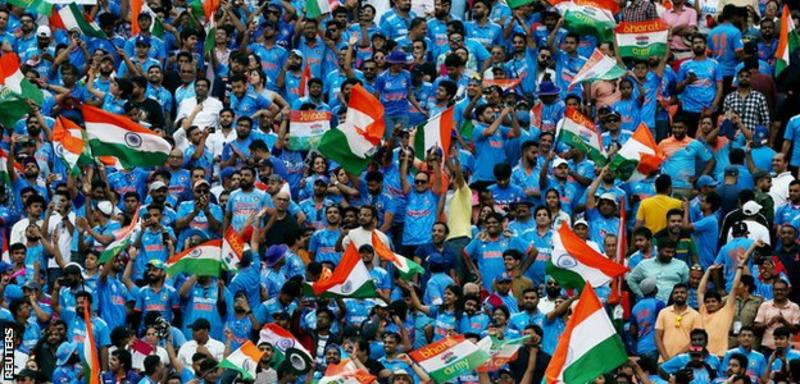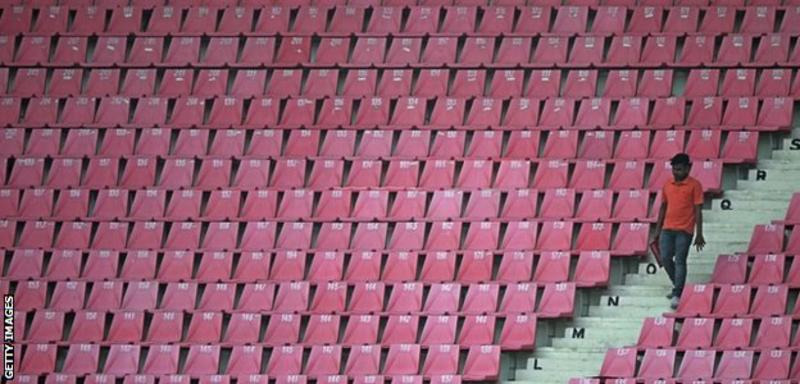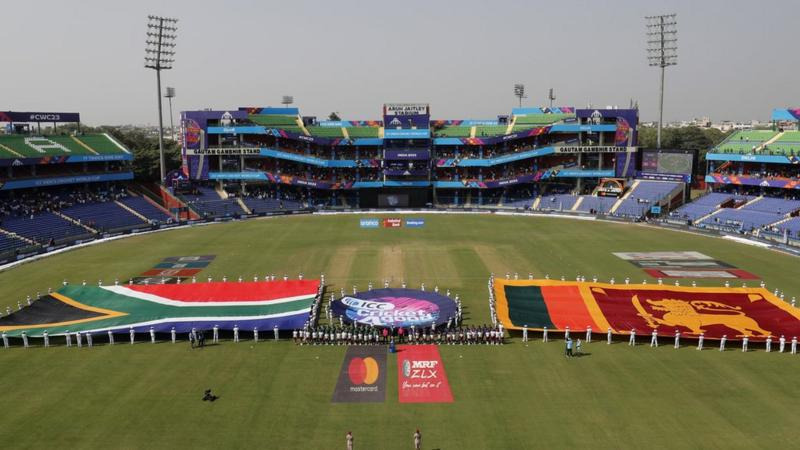Two weeks in and, on the pitch, the Cricket World Cup in India is bubbling away nicely.
Shock results this week – first England beaten by Afghanistan before the Netherlands’ superb win over South Africa – have breathed life into the tournament.
But the crowds, or lack of them, at matches continues to be a point of discussion.
BBC Sport looks at the issues involved…
What have the crowds been like?

India matches aside, there have been swathes of empty seats at matches involving neutral teams.
The tournament began with England’s defeat by New Zealand, played at the massive Narendra Modi Stadium in Ahmedabad.
Organisers said 45,000 tickets were sold for that match, which would make it the highest attended opener in World Cup history. But there were more than 80,000 empty seats in the 132,000-capacity venue.
Since then there have been some good crowds – England v Afghanistan in Delhi one obvious example between neutral teams – mixed in with underwhelming attendances in a country famed for its love of cricket.
Official figures have been difficult to obtain from organisers.
The World Cup is an International Cricket Council (ICC) event but is run at a day-to-day level by the hosts, in this case the Board of Control for Cricket in India (BCCI).
There was no number given, despite repeated requests, for the attendance at Saturday’s meeting between India and Pakistan in Ahmedabad, for what many expected to be a record crowd for a cricket match.
More than 95% of tickets were sold for the 2019 World Cup in England and Wales. Early signs suggest that will not be matched in India, although English cricket stadiums are much smaller than those in India.
The 45,000 at that first match would have filled Lord’s and left another 14,000 stood outside.
What have the problems been?

There have been widespread reports on social media of fans struggling with the online platform used to sell and distribute tickets, with matches or sections of the ground shown as sold out, only to be largely empty.
There was confusion when thousands of tickets were released on the day of India’s match against Australia in Chennai – a fixture previously believed to have already been sold out.
BBC Sport has spoken to England fans on flights to matches who have not received their tickets, while others have been told theirs had to be collected from entirely different cities from where the match was being played.
This all comes after the schedule for the tournament was not finalised until August – tickets went on sale less then six weeks before it began, making it difficult for fans to plan travel from overseas or other parts of India.
Visas have been a problem too.
Fans have been largely unable to travel from Pakistan because of the political situation between the two countries, with Pakistan coach Mickey Arthur a critic of the partisan nature of the crowd for their match against India.
What else is at play?

Many have suggested the low crowds are evidence of the slow death of the 50-over format.
India certainly has little trouble filling stadia for the Indian Premier League – the most lucrative of the T20 franchise leagues.
Those matches largely happen in the evenings, after locals finish work, whereas most World Cup matches have started at 14:00 local time, although crowds have grown in the late afternoon when temperatures are also cooler.
Crowds at India matches suggests the Indian public loves Indian cricket. Whether that extends to neutral matches is less certain.
The multi-cultural nature of the UK’s population certainly helps when it comes to attendances at non-England games in 2019.
It should also be said that last year’s T20 World Cup in Australia had some strong crowds – 90,000 watched India v Pakistan in Melbourne – but also many poorly attended games.
This is the third men’s World Cup in as many years across formats, with another T20 edition to follow in seven months after the 2023 event ends.
Yet when world champions England, with IPL stars like Ben Stokes and Jos Buttler, face South Africa, who will include the likes of Quinton de Kock and Kagiso Rabada, in Mumbai on Saturday, it will worry organisers if the 33,000-capacity Wankhede Stadium is full of empty seats.


Source : BBC


